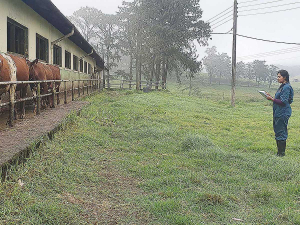NZ Catchment Groups Thrive with ‘Source to Sea’ Approach
The most successful catchment groups in NZ are those that have 'a source to sea' approach.
 Massey University PhD student Shashi Ekanayake researching for her thesis on a dairy farm in Sri Lanka.
Massey University PhD student Shashi Ekanayake researching for her thesis on a dairy farm in Sri Lanka.
An international PhD student, working on animal health issues in the dairy sector, has been granted a border exemption to enter New Zealand and continue studying.
Massey University says it is excited to welcome back Shashi Ekanayake, a final year doctorate student from the School of Veterinary Science, who returned after nearly a year in home country, Sri Lanka.
Ekanayake’s PhD project is on dairy cattle lameness, reproduction and milk production in New Zealand and Sri Lanka, and as such her research took her back to her home country right before the pandemic began.
Originally Ekanayake was set to be in Sri Lanka for six-months researching for her thesis however, COVID-19 and its consequences kept her there much longer.
“While I was working overseas, I had to interrupt my data collection due to the COVID-19 outbreak and the restrictions imposed in Sri Lanka.”
As a result of local curfews Ekanyake was unable to collect data for nearly two months before completing her collection in early August. She then had another five-month wait to receive a border exemption to return to New Zealand.
She says returning to New Zealand to continue her studies was crucial to finishing her PhD which is set to fill an important gap in research regarding cattle lameness.
“There is very limited research from New Zealand and Sri Lanka although it is one of the main issues in dairy cows, at the completion of my PhD we will have much more insight into this.
“Since I am in my final year of PhD, direct supervision was necessary especially to help with my data analysis and thesis writing not to mention having the support of Massey staff and other students around.”
Ekanyake says New Zealand was her dream country in which to study and she was aware of Massey University as one of the best veterinary schools in the world.
“I could not have asked for a better place to study; Massey has fantastic research expertise and renowned scientists who have been amazing PhD supervisors.”
As well as her PhD supervisors, Ekanyake would like to thank the New Zealand Ministry of Education, Ministry of Health and the Defence Force who granted her a border exemption.
“I am so thrilled to be back in New Zealand after such a long time away and I am excited to finish my studies here.”
Global trade has been thrown into another bout of uncertainty following the overnight ruling by US Supreme Court, striking down President Donald Trump's decision to impose additional tariffs on trading partners.
Controls on the movement of fruit and vegetables in the Auckland suburb of Mt Roskill have been lifted.
Fonterra farmer shareholders and unit holders are in line for another payment in April.
Farmers are being encouraged to take a closer look at the refrigerants running inside their on-farm systems, as international and domestic pressure continues to build on high global warming potential (GWP) 400-series refrigerants.
As expected, Fonterra has lifted its 2025-26 forecast farmgate milk price mid-point to $9.50/kgMS.
Bovonic says a return on investment study has found its automated mastitis detection technology, QuadSense, is delivering financial, labour, and animal-health benefits on New Zealand dairy farms worth an estimated $29,547 per season.
OPINION: Staying with politics, with less than nine months to go before the general elections, there’s confusion in the Labour…
OPINION: Winston Peters' tirade against the free trade deal stitched with India may not be all political posturing by the…